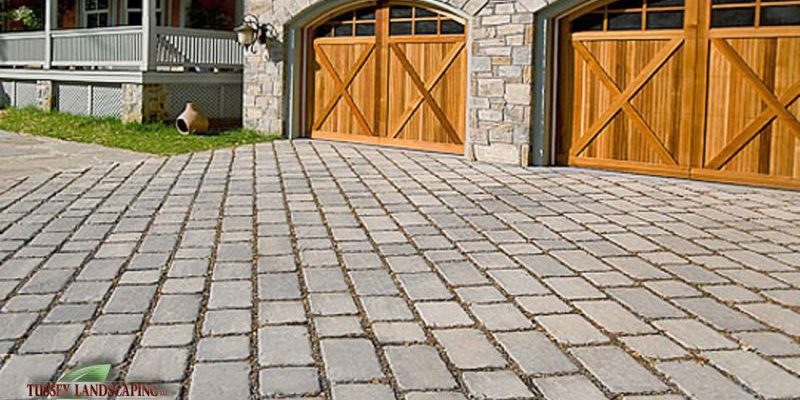
Permeable pavers are becoming an increasingly popular solution for homeowners and commercial properties dealing with drainage issues—and for good reason. Below, we’ll explain what permeable pavers are, how they work, and why they’re an excellent choice for driveways, walkways, patios, and other outdoor surfaces.
TL;DR – Permeable Pavers: What They Are and How They Work
- Permeable pavers are interlocking concrete pavers that let rainwater pass through the joints and into the ground—reducing runoff and puddles.
- They solve drainage issues caused by traditional impermeable surfaces like asphalt and concrete.
- Instead of sand, permeable pavers use washed gravel between joints to allow water infiltration.
- The base is deeper (12″+) and made of clean stone with voids that let water move downward.
- Optional underground drainage systems can be installed in poor soil conditions.
- They provide a durable, attractive, eco-friendly solution for driveways, patios, walkways, and parking areas.
What Are Permeable Pavers?
Permeable pavers are a specialized type of interlocking concrete paver designed to let rainwater pass through the surface and soak into the ground below. Unlike traditional paving systems that create runoff, permeable pavers eliminate the need for drains or visible collection systems.
They are especially beneficial in areas where stormwater management is a challenge.
Why Use Permeable Pavers?
For most of history, rainwater naturally soaked into the soil. But over the past century, cities have become covered in impermeable surfaces—roads, sidewalks, driveways, parking lots, and rooftops. This created widespread drainage problems, leading to expensive stormwater infrastructures that address the symptoms rather than the cause.
Permeable paving solves the problem at the source. It provides a durable, attractive surface that can handle vehicle traffic while allowing water to pass through it. The visible pavers and their open joints are only part of the system—the real magic happens underneath.
How Permeable Pavers Are Installed
Permeable pavers share similarities with traditional paver installation but include key differences to facilitate drainage:
- Joint Filler:
- Traditional pavers use polymeric sand, which blocks water infiltration.
- Permeable pavers use washed #8 or #9 gravel, allowing water to drain through the joints.
- Base Construction:
- Regular pavers use a 6–10″ compacted stone base.
- Permeable systems require a deeper base—often 12″ or more—made from clean stone with no fines.
- The voids in the stone allow water to move freely down into the soil.
- Optional Drainage Systems:
- In areas with poor soil drainage or heavy rainfall, an underground system can be added beneath the base to collect and redirect water to a reservoir or natural outlet.
Permeable pavers provide durable, attractive, and environmentally friendly solutions for managing stormwater. Whether you’re building a driveway, patio, walkway, or even a commercial parking lot, they offer a clean and effective way to eliminate puddles and runoff.
If you’d like to explore how permeable pavers can improve your landscape, feel free to contact us—we’d love to help.
